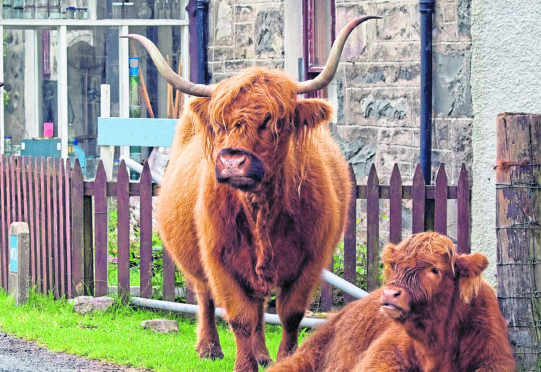A row has erupted over the return of cattle to Plockton’s main street.
The Press and Journal previously reported that a 15-year ban on cattle in the village and on the beach had lapsed.
But now, the Grazings Committee in Plockton is refusing to take the advice of the National Trust of Scotland in undertaking an official assessment before allowing cattle back onto the common land.
A financial payment and agreement between crofters and the National Trust for Scotland to keep cattle out of the village, and off the beach, ended in November.
Crofters are planning to take up their heritable rights to use the common land in the west coast village, popular with visitors from all over the world, from this month.
When asked if the crofters would do a risk assessment, a spokeswoman from the Grazing Committee in Plockton said: “No we are not going to do one, the National Trust have suggested to us that we should do one, but we are not going to.
“The reason being that no other crofter or group in the Highlands have been asked to do one, so why should we.”
It is understood cattle will return to the village in April.
A spokesman for the National Trust for Scotland said: “We were disappointed to hear that the Grazing Committee has decided not carry out a risk assessment prior to the possibility of cattle returning to Plockton’s streets.
“It is still our view that this would have been in the best interests of both crofters and local residents.
“While crofters are well within their rights to graze cattle within the town, any liability arising from this will be theirs.”
Village resident Ed Stanley told the P&J he was very concerned about the risk to children and the ageing population of the village from the reintroduction of the cows.
Mr Stanley said: “I have written a report for the community on the risk of reintroducing cattle.
“There is a risk, however small, because of animal faeces to our children who may play on the beach before putting their hands in their mouths, and to our ageing population.
“In the current litigious society people are constantly trying to reduce risk. In Plockton we are deliberately introducing an increased risk, and for little good reason.”
